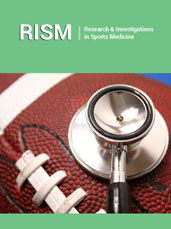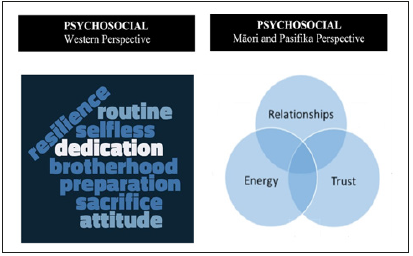- Submissions

Full Text
Research & Investigations in Sports Medicine
The Value of Relationships, Trust and Energy in Athlete Development
Sierra Keung*
School of Sport & Recreation, New Zealand
*Corresponding author: Sierra Keung, School of Sport & Recreation, Auckland, New Zealand
Submission: August 23, 2019;Published: August 28, 2019

ISSN: 2577-1914 Volume5 Issue2
Abstract
A high proportion of Māori and Pasifika play rugby league at both the participation and professional levels in New Zealand. Despite the physicality of the game appealing to young Māori and Pasifika, research suggests the psychosocial aspect of athlete development is critical to longevity and success. Presently, there are a lack of tools, practices and processes that respond appropriately to the psychosocial needs of Māori and Pasifika athletes. To address this gap, there is a need to understand what psychosocial looks like for Māori and Pasifika in order to implement more culturally responsive practices. Therefore, this article offers a perspective on the psychosocial aspect of athlete development through a collective Māori and Pasifika lens.
Keywords: Māori and Pasifika; Athlete development; Psychosocial development
Introduction
Since 2012, 70 of the 75 players who have been selected for New Zealand’s senior men’s rugby league (RL) team were of Māori or Pasifika heritage. Māori are the Indigenous people of Aotearoa, New Zealand and Pasifika is a broad term used to refer to people who connect back to the Island nations of the South Pacific. In New Zealand, these communities make a significant contribution to the game of RL at both the participation and professional levels. The start of the inaugural Rugby League International Federation Oceania Cup [1] further highlights the contribution Indigenous and Pasifika communities make to the game at an international level. The Oceania Cup offered players a platform to showcase their footy skills and represent their cultural heritage on a global stage, outside of the world cup competition. Despite the significant contribution of our Indigenous communities, existing talent development research fails to acknowledge cultural nuances that are critical to the preparation and performance of Māori or Pasifika athletes. Given the continued contribution Indigenous and Pasifika communities make to the growth of RL in particular, we need to use processes and practices that resonate with the diverse player base.
Discussion
The four key pillars that typically shape the talent development pathway are: physical, technical, tactical and psychosocial. Given that RL is a high-impact, collision sport, the predominance of Māori and Pasifika engaging and succeeding in RL has been related to their physical attributes and talents [2]. Research highlights the critical role the psychosocial aspect plays in facilitating longevity and success for a professional sportsperson [3]. For many teenage Māori and Pasifika athletes, this can be more arduous than the physical aspect. To-date, the psychosocial aspect of talent development has been discussed from a Western perspective, which focuses on the achievements of the individual. My research [4] challenges this with an approach that more appropriately reflects Māori and Pasifika, within the context of RL. A significant finding was the importance and value of relationships with other people, including family and mentors. My research suggests that key relationships are those that are anchored by trust and create an energy that helps junior RL players to process mentally trying times they may experience as an athlete. When viewed through a Māori and Pasifika lens, psychosocial is (re)defined as the inter-connectedness of relationships, trust and energy see Figure 1. This relational foundation is missing when psychosocial development is viewed from a Western perspective.
Figure 1:Psychosocial development through the different lens [4].

Elite athletes recognize that failure is part of the process for success and growth [5]. The ability to cope with setbacks, however, is dependent on the athlete’s psychosocial foundation. This foundation is developed as they progress to the senior elite level. As shown in Figure 1, developing attributes such as resilience, brotherhood and attitude is but one view of the psychosocial aspect of talent development. A more appropriate approach would integrate practices throughout the talent development process to facilitate reciprocal relationships, based on trust. For Māori and Pasifika, relationships also include those of a spiritual nature. Faith or spirituality play a significant role in strengthening the overall health and well-being for Māori [6] and Pasifika [7]. Not surprisingly, I found in my study, that faith and a belief in God gave athletes strength and perspective in dealing with adversity [4]. As such, offering time or space for athletes to meditate, read or listen to scripture, or simply express gratitude could be just as impactful for development and performance, as scheduled training, gym and nutrition sessions. Consequently, spirituality or faith is a critical element of talent development that tends to be overlooked when facilitating the performance of Māori and Pasifika athletes.
Conclusion
The organizational structure of professional sports is heavily influenced by the Eurocentric power structure and culture. Māori and Pasifika are expected to integrate into a system that does not typically reflect their cultural structure, values and beliefs. Whilst there are specialist support people and resources available in the professional sporting world to help athletes manage the demands of becoming a professional sportsperson, greater awareness and consideration for cultural nuances is needed. Practitioners need to consider the value of relationships, trust and energy for Māori and Pasifika athletes to succeed in the high-performance sport environment. Through a collective cultural lens, success is measured by how well one takes care of those around them. Athletes are likely to progress better through the development process when they know and feel that their support team (i.e. coaches, trainers, managers) takes care of them. For Māori and Pasifika athletes, this includes their family and the wider collective they represent. Hence, it is critical that practitioners consider the value of relationships, trust and energy when engaging with Māori and Pasifika athletes. Meaning, there is a need to implement practices throughout the talent development pathway that facilitate opportunities to establish reciprocal and trusting relationships, which stimulate and support an energy, conducive to the reinforcement of an athlete’s psychosocial foundation within the high-performance sport setting.
Acknowledgement:
The Conversation.
Conflict of Interest
1. Recipient of a doctoral scholarship from New Zealand Rugby League (NZRL) and Sports Performance
2. Research Institute New Zealand (SPRINZ)
3. Member of the Professional Association of Athlete Development Specialists (PAADS)
Member of the Association for Applied Sports Psychology (AASP).
References
- (2019) RLIF Oceania Cup confirmed for
- Hawkes G (2018) Indigenous masculinity in sport: The power and pitfalls of rugby league for Australia’s Pacific Island diaspora. Leisure Studies 37(3): 318-330.
- Larsen C, Alfermann D, Henriksen K, Christensen M (2014) Preparing footballers for the next step: An intervention program from an ecological perspective. The Sport Psychologist 28(1): 91-102.
- Keung S (2018) The emotional side: Using conversation to facilitate an interconnected analysis of psychosocial development shared by Māori and Pasifika young men in Rugby League (Doctoral dissertation, Auckland University of Technology), New Zealand.
- Hodge K, Smith W (2014) Public expectation, pressure, and avoiding the choke: A case study from elite sport. The Sport Psychologist 28(4): 375-389.
- Durie M (1994) Whaiora: Māori health development. Oxford University Press, Australia & New Zealand.
- Pulotu EF (2001) Fonofale model of health.
© 2018 Sierra Keung. This is an open access article distributed under the terms of the Creative Commons Attribution License , which permits unrestricted use, distribution, and build upon your work non-commercially.
 a Creative Commons Attribution 4.0 International License. Based on a work at www.crimsonpublishers.com.
Best viewed in
a Creative Commons Attribution 4.0 International License. Based on a work at www.crimsonpublishers.com.
Best viewed in 







.jpg)






























 Editorial Board Registrations
Editorial Board Registrations Submit your Article
Submit your Article Refer a Friend
Refer a Friend Advertise With Us
Advertise With Us
.jpg)






.jpg)














.bmp)
.jpg)
.png)
.jpg)










.jpg)






.png)

.png)



.png)






